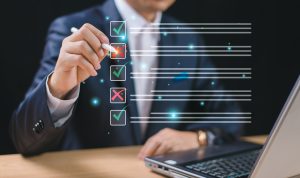 Imagine you’re an associate at a consulting firm. You’re surprised to see a new “AI Assist” button appear in your email application one morning. Without any training or guidance from your firm’s IT department, you decide to try it out, asking the AI to draft a response to a client’s inquiry about tax implications for a proposed merger. The AI confidently generates a response that looks professional and well-written, which you quickly review and send. Three days later, your managing partner calls you into their office—the AI cited outdated tax regulations and recommended a structure that would create significant liability for the client. The incident triggers an urgent internal review, revealing that dozens of employees have been using the undisclosed AI feature for weeks, potentially exposing the firm to professional liability and damaging client relationships.
Imagine you’re an associate at a consulting firm. You’re surprised to see a new “AI Assist” button appear in your email application one morning. Without any training or guidance from your firm’s IT department, you decide to try it out, asking the AI to draft a response to a client’s inquiry about tax implications for a proposed merger. The AI confidently generates a response that looks professional and well-written, which you quickly review and send. Three days later, your managing partner calls you into their office—the AI cited outdated tax regulations and recommended a structure that would create significant liability for the client. The incident triggers an urgent internal review, revealing that dozens of employees have been using the undisclosed AI feature for weeks, potentially exposing the firm to professional liability and damaging client relationships.
Articles Posted in Artificial Intelligence
Does Your AI Chatbot Collect Biometric Data?
 The latest trend in generative AI is the rise of “AI Assistants” or “Chatbots.” These tools are increasingly trained on internal company data to interact directly with consumers and aim to improve customer service by generating responses on behalf of the organization. However, this brings new legal challenges, especially regarding data privacy. Because “biometric” data or information is often broadly defined, compliance with privacy regulations becomes critical when chatbots and AI agents use voiceprints, cameras (capturing or processing hand or facial geometry) or other sensors to provide a personalized service. Companies should implement safeguards to meet legal requirements, avoid penalties, and secure insurance coverage to mitigate financial risks related to compliance with data privacy laws and regulations.
The latest trend in generative AI is the rise of “AI Assistants” or “Chatbots.” These tools are increasingly trained on internal company data to interact directly with consumers and aim to improve customer service by generating responses on behalf of the organization. However, this brings new legal challenges, especially regarding data privacy. Because “biometric” data or information is often broadly defined, compliance with privacy regulations becomes critical when chatbots and AI agents use voiceprints, cameras (capturing or processing hand or facial geometry) or other sensors to provide a personalized service. Companies should implement safeguards to meet legal requirements, avoid penalties, and secure insurance coverage to mitigate financial risks related to compliance with data privacy laws and regulations.
California Legislature Passes Generative AI Training Data Transparency Bill (UPDATED)
The California legislature recently passed Assembly Bill 2013 (AB 2013) on August 27, 2024, a measure aimed at enhancing transparency in AI training and development. If signed into law by Governor Gavin Newsom, developers of generative AI systems or services that are made available to Californians would be required to disclose significant information on the data used to train such AI systems or services. This, in turn, may raise novel compliance burdens for AI providers as well as unique challenges for customers in interpreting the information.
Discovery Dilemma: An Update on the Legal Battle Between The New York Times and OpenAI
OpenAI’s defense of the lawsuit brought by The New York Times (“The Times”) has sparked controversy relating to OpenAI’s discovery demand for access to reporter notes and other behind-the-scenes materials associated with millions of articles that appeared in The Times.
Colleagues Jennifer Altman, Shani Rivaux and Macarena Fink provide a briefing on OpenAI’s discovery request in their recently published client alert, “Discovery Dilemma: An Update on the Legal Battle Between The New York Times and OpenAI.”
Legal Riffs: Music Industry Alleges AI Is Out of Tune
In late June, Universal Music Group (UMG) Records, Sony Music Entertainment, and other major record labels filed two complaints against two generative artificial intelligence (“gen AI”) music startups, Suno, Inc. (Suno) and Uncharted Labs, Inc. (Udio). The concurrently filed complaints allege that the gen AI technology produced by Suno and Udio directly infringes on copyrights owned by these record labels.
Colleagues Shani Rivaux, Macarena Fink and Catherine Perez provide a briefing on these complaints in their recently published client alert, “Legal Riffs: Music Industry Alleges AI Is Out of Tune.”
What You Need to Know If You’re Using AI-Generated Voices for Your Company
 Global music superstar Taylor Swift began her music career in Nashville, so we thought it fitting that on July 1, with the end of the Eras Tour in sight, the Ensuring Likeness Voice and Image Security (ELVIS) Act went into effect in Tennessee. This marks the latest front in the effort to navigate the interplay between the capability of generative AI and the Right of Publicity for music and voice artists alike.
Global music superstar Taylor Swift began her music career in Nashville, so we thought it fitting that on July 1, with the end of the Eras Tour in sight, the Ensuring Likeness Voice and Image Security (ELVIS) Act went into effect in Tennessee. This marks the latest front in the effort to navigate the interplay between the capability of generative AI and the Right of Publicity for music and voice artists alike.
From Encryption to Employment, U.S. Federal Agencies Brace for the Effects of Quantum Computing, AI and More
In this week’s edition of Consumer Protection Dispatch, we look at the latest regulatory developments from the U.S. Department of Commerce, Consumer Financial Protection Bureau, and the Securities and Exchange Commission regarding data and AI.
Consumer Protection Dispatch: The Latest Developments in the World of Consumer Protection (5/22/24)
(The Consumer Protection Dispatch summarizes industry news and updates on emerging issues involving a variety of consumer protection issues including, but not limited to, data and AI.)
This week’s edition includes latest developments relating to AI laws passed by Colorado, Tennessee and Utah, U.S. Senate bipartisan working group on AI, a new privacy bill from Vermont and a new privacy law from Maryland, a new Colorado law protecting neural data, and updates from the California Privacy Protection Agency.
Could Your AI Testing Tool Throw You into the Breach?
Testing AI systems is essential for ensuring their effectiveness, reliability and safety in real-world applications. Companies can employ various mechanisms to rigorously evaluate their AI technologies.
In “Is Your AI Testing Tool a Breach of Contract Claim Waiting to Happen?”, colleagues Mia Rendar and Sam Reno explore how, as AI products grow in both popularity and technical complexity, and as robust testing tools become indispensable, the very utilization of such tools may unwittingly expose companies to legal risks.
Artificial Intelligence in Renewable Energy | Pratt’s Energy Law Report
The potential of artificial intelligence to transform industries is well-established, but what exactly does that mean for a specific industry?
For Pratt’s Energy Law Report, Robert A. James, Aimee P. Ghosh, Cara M. MacDonald and the Hon. Jerry McNerney take readers on a deeper dive exploring the opportunities, risks and regulations in the specific applications of artificial intelligence to renewable energy and to the electric power ecosystem into which renewables fit.
Read “Artificial Intelligence in Renewable Energy” now.
 Internet & Social Media Law Blog
Internet & Social Media Law Blog


